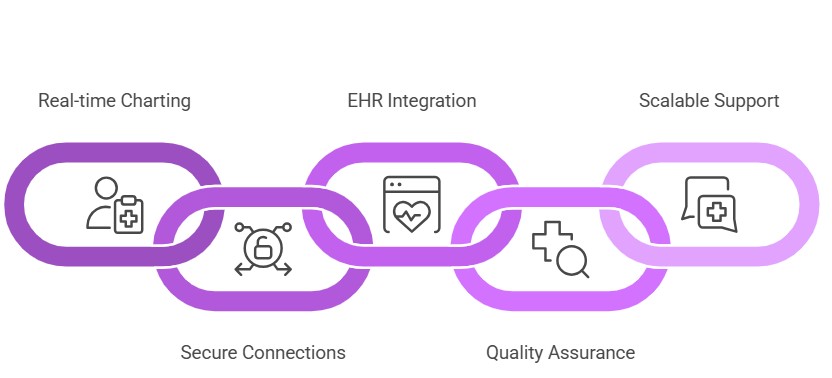How Medical Documentation Support Empowers Providers to Focus on Care
In today’s fast-paced healthcare environment, physicians spend nearly as much time documenting as they do treating patients. The result? Burnout, after-hours charting, and reduced time for meaningful patient interactions.
That’s why medical documentation support – especially through virtual medical scribes – has become essential to modern healthcare practices.
Why Documentation Support Matters
Every provider knows that accurate documentation drives clinical quality, compliance, and reimbursement. Yet EHR systems often add complexity instead of efficiency.
ScribeEMR’s virtual medical scribes help bridge that gap. They handle the real-time charting so physicians can stay fully present with patients, ensuring documentation is accurate, complete, and compliant.
1. Enhancing Efficiency
Virtual medical scribes document patient encounters directly into the EHR as the provider speaks. This streamlined process eliminates the need for end-of-day charting, saving valuable time.
With ScribeEMR’s support, providers typically see more patients per day and complete documentation before leaving the clinic – no late-night EHR sessions.
2. Elevating Patient Care and Satisfaction
When providers aren’t burdened by typing or navigating EHR fields, they can maintain eye contact, actively listen, and build stronger relationships with patients.
This leads to improved patient trust, satisfaction, and clinical outcomes. Studies show that when physicians engage fully during visits, patient adherence and satisfaction scores rise significantly.
3. Preventing Provider Burnout
Documentation fatigue is one of the biggest contributors to physician burnout. Virtual scribes reduce this administrative strain by handling repetitive charting tasks, allowing providers to focus on their passion – medicine, not paperwork.
Providers who partner with ScribeEMR report reduced stress, improved work-life balance, and more time for family, teaching, and patient care.
4. Improving Accuracy and Compliance
ScribeEMR scribes are trained in clinical terminology, EHR workflows, and specialty-specific documentation standards. They ensure that every encounter note reflects accurate history, assessment, and plan details – minimizing errors and improving coding accuracy.
Accurate documentation not only improves compliance but also reduces claim denials and audit risks, leading to smoother revenue cycles.
5. Reducing Costs and Boosting Revenue
Hiring and training in-house documentation staff can be costly. Outsourcing medical documentation to ScribeEMR offers a cost-effective and scalable solution.
By increasing chart accuracy and reducing missed billing opportunities, providers experience stronger cash flow and fewer revenue leaks – while saving on administrative overhead.
How ScribeEMR’s Documentation Support Works
ScribeEMR connects providers with skilled virtual medical scribes who join live patient encounters securely and in real time. The scribe listens, documents the visit, and enters notes directly into the EHR – ready for the provider’s review and sign-off.
This workflow ensures that charts are completed before the provider leaves for the day.

Key features include:
- Real-time charting for all encounter types
- HIPAA-compliant, secure connections
- Integration with all major EHR systems
- U.S.-based QA team ensuring accuracy and quality
- Scalable support across specialties
Recognized for Excellence
ScribeEMR is a Best in KLAS Winner for 2024 and 2025, recognized in the KLAS Virtual Scribing Services report for outstanding value, operations, relationship management, and staff quality.
This third-party validation reflects ScribeEMR’s commitment to quality, reliability, and client success. Providers nationwide trust ScribeEMR to deliver medical documentation solutions that drive measurable results.
What Providers Are Saying
“Our scribe has been a true extension of our team – professional, attentive, and efficient. The difference in our productivity and patient engagement is remarkable.”
Feedback like this underscores the impact of ScribeEMR’s virtual documentation services: smoother workflows, happier providers, and more satisfied patients.
The Bigger Picture: Restoring the Joy of Practicing Medicine
Healthcare has become more digital – but not always more efficient. Providers often feel they’re serving the computer more than the patient. Medical documentation support changes that narrative.
By entrusting charting to trained professionals, providers regain control of their time, restore the joy of practicing medicine, and improve care continuity.
ScribeEMR’s mission is simple – to empower providers to focus on what matters most: their patients.
Conclusion
Accurate, timely, and compliant documentation is the foundation of excellent healthcare – but it shouldn’t come at the cost of physician well-being.
With ScribeEMR’s virtual medical documentation support, healthcare organizations can:
✅ Improve efficiency and chart completion rates
✅ Strengthen compliance and accuracy
✅ Enhance patient care and satisfaction
✅ Reduce burnout and administrative overload
It’s time to bring balance back to medicine – one chart at a time.
👉 Learn more about how ScribeEMR’s award-winning virtual medical scribe services can transform your workflow:
